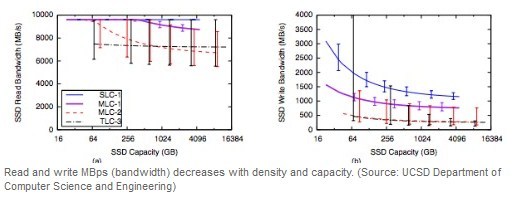Soldato
- Joined
- 13 Oct 2011
- Posts
- 11,881
- Location
- Melbourne, Australia
Researchers at the University of California, San Diego, have concluded that solid state drives (SSDs) have a bleak future in the evolution of computing technology. They have discovered that fast flash based storage are facing come pretty glaring technology hurdles during their natural course of evolution, which they don't think it will overcome. To begin with, shrinking (miniaturizing) them, to increase capacity or decrease manufacturing costs, will severely degrade performance beyond a point, 6.5 nm silicon fab process.
The scientists studied 45 different flash chips in various sizes, which showed that scaling of latencies and error-rates are 'tolerable' enough as the technology miniaturizes only till 6.5 nm, or the year 2024, when this fab process will be common, beyond which they question the drives' viability. Beyond this point, the more capacity you squeeze into flash memory chips, the more performance degrade (latency and error-rate scale beyond tolerable scales).


While the density of SSDs grows and the cost per gigabyte shrinks, "everything else about them is poised to get worse," said Laura Grupp, a graduate student at the University of California, San Diego. "This makes the future of SSDs cloudy: While the growing capacity of SSDs and high IOP rates will make them attractive for many applications, the reduction in performance that is necessary to increase capacity while keeping costs in check may make it difficult for SSDs to scale as a viable technology for some applications," the author of the study.
The study, entitled "The Bleak Future of NAND Flash Memory", can be accessed here.
I don't agree!






